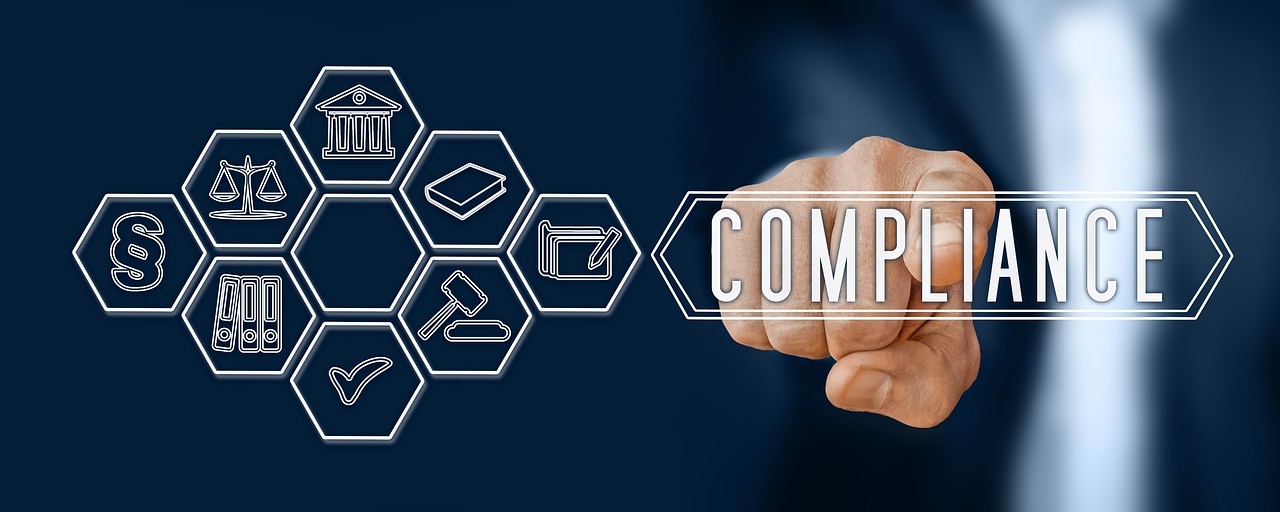In today’s rapidly changing global landscape, immigration compliance has become an increasingly complex and critical area of law for businesses and business owners alike. With ever-evolving regulations and strict enforcement measures, it is essential for companies to navigate this complex legal landscape to avoid penalties, litigation, and reputational damage. Whether you are a multinational corporation or a small startup, understanding and ensuring compliance with immigration laws is crucial. This article will provide you with a comprehensive overview of immigration compliance, covering key laws, regulations, and best practices to help your company stay on the right side of the law.
Understanding Immigration Compliance
Immigration compliance refers to the adherence to the laws and regulations set forth by the government regarding immigration matters. It is essential for companies to understand and follow these regulations to ensure they are operating within the legal framework.

Why Immigration Compliance is Important
Immigration compliance is important for several reasons. First and foremost, it is a legal requirement. Failure to comply with immigration laws can result in severe consequences such as fines, penalties, and even criminal charges. By prioritizing compliance, companies can avoid these detrimental outcomes.
Secondly, immigration compliance ensures that businesses are maintaining a level playing field. By hiring and employing individuals who are authorized to work in the country, companies prevent unfair competition and protect the job market.
Lastly, immigration compliance fosters a positive corporate culture. By employing individuals from diverse backgrounds, businesses can benefit from a variety of perspectives and skills, enhancing creativity and innovation within the organization.
Benefits of Immigration Compliance
Compliance with immigration laws offers several benefits to businesses. Firstly, it minimizes the risk of legal and financial consequences. By following the rules, companies can avoid fines, penalties, and legal disputes that can arise from non-compliance.
Secondly, immigration compliance helps maintain a positive reputation for the company. Employing individuals legally and ethically demonstrates a commitment to following the law and being a responsible corporate citizen. This can enhance a company’s image and attract potential customers, investors, and business partners.
Furthermore, immigration compliance can improve employee morale and productivity. By ensuring fair employment practices and equal opportunities, businesses can create a positive work environment that fosters loyalty and high performance among employees.
Consequences of Non-compliance
Non-compliance with immigration laws can have severe consequences for businesses. The most significant consequence is the potential for legal and financial penalties. Fines for non-compliance with immigration laws can reach substantial amounts, causing significant financial strain on businesses.
Additionally, non-compliance can lead to reputational damage. Negative publicity and public scrutiny can tarnish a company’s brand and credibility, potentially resulting in a loss of customers, investors, and business partners.
Furthermore, non-compliance can result in the loss of valuable employees. If companies are found to be employing unauthorized workers, they may be required to terminate their employment, resulting in a loss of talent and the need to find replacements.
In extreme cases, non-compliance with immigration laws can lead to criminal charges, imprisonment, and even the closure of a business. It is essential for companies to understand the consequences of non-compliance and take proactive steps to ensure compliance with immigration regulations.
Key Steps for Achieving Immigration Compliance
To achieve immigration compliance, companies must take several key steps. These steps involve determining employer compliance obligations, developing robust compliance policies, and conducting regular internal audits.
Determining Employer Compliance Obligations
The first step towards immigration compliance is for companies to understand their specific obligations as employers. This includes ensuring that the company is registered and authorized to employ foreign workers if necessary. It also involves understanding the relevant visa categories and requirements for hiring foreign workers.
Developing Robust Compliance Policies
Once the employer obligations are established, companies should develop comprehensive compliance policies and procedures. These policies should outline the company’s commitment to immigration compliance and provide detailed guidelines for hiring and employing foreign workers.
The policies should cover key areas such as document verification, employment eligibility verification, and recordkeeping requirements. Clear procedures should be established to ensure consistency and uniformity in the company’s immigration compliance practices.
Conducting Regular Internal Audits
Regular internal audits are crucial for maintaining immigration compliance. These audits involve reviewing the company’s practices, processes, and documentation to ensure compliance with immigration laws. Audits should be conducted at regular intervals and should be thorough and comprehensive.
Internal audits help identify any gaps or deficiencies in the company’s immigration compliance practices, allowing for prompt corrective actions. They also serve as a proactive measure to mitigate the risk of non-compliance and ensure ongoing adherence to immigration regulations.

Employee Onboarding and Immigration Compliance
Employee onboarding is a critical stage in ensuring immigration compliance. Companies must take specific steps to verify employment eligibility and ensure proper documentation for each employee.
Ensuring Proper Documentation
During the onboarding process, companies should require employees to provide appropriate documentation to verify their identity and employment eligibility. This typically involves completing the Form I-9, which is a mandatory requirement for all employers in the United States. The Form I-9 verifies the identity and eligibility of employees to work in the country.
It is essential for companies to review and retain the Form I-9 for all employees and comply with the recordkeeping requirements set forth by immigration authorities.
Verifying Employment Eligibility
Employers must verify the employment eligibility of all employees using the documentation provided during the onboarding process. This includes reviewing and validating documents such as passports, driver’s licenses, or Social Security cards to ensure that employees are authorized to work in the country.
Employers should be diligent in their verification processes and ensure they are following proper procedures to avoid potential penalties or violations related to employment eligibility.
Understanding the Form I-9
The Form I-9 is a critical document in the employee onboarding process. Companies must familiarize themselves with the requirements and procedures outlined in the Form I-9 and ensure that all employees complete it accurately and timely.
It is essential to understand that incomplete or incorrect Form I-9s can result in penalties and violations. Employers should provide proper training and education to employees responsible for completing and maintaining the Form I-9.
Hiring Foreign Workers and Immigration Compliance
Hiring foreign workers requires companies to navigate complex visa categories and fulfill specific sponsorship and certification requirements.
Understanding Visa Categories
Employers must understand the various visa categories available for hiring foreign workers. Different visas cater to different purposes and job roles. It is crucial to identify the appropriate visa category based on the employee’s qualifications and the nature of their prospective employment.
By understanding the visa categories, companies can ensure that they are complying with the immigration regulations and following the correct procedures for hiring foreign workers.
Sponsoring Foreign Workers
Sponsoring foreign workers involves the employer acting as the petitioner and submitting the necessary paperwork and supporting documents to enable the foreign worker to obtain a visa. This process requires adherence to specific requirements and timelines established by immigration authorities.
Employers should familiarize themselves with the sponsorship process and ensure that they have a thorough understanding of their responsibilities as sponsors. This includes ensuring that the foreign worker meets the eligibility criteria for the chosen visa category and providing the required documentation to support the visa application.
Navigating the PERM Labor Certification Process
The PERM Labor Certification process is a requirement for hiring certain foreign workers. It involves obtaining certification from the Department of Labor (DOL) to demonstrate that there are no qualified U.S. workers available to fill the position for which the employer intends to hire a foreign worker.
Employers must navigate the PERM Labor Certification process diligently and comply with the DOL’s requirements to ensure a successful certification. This process typically involves conducting recruitment efforts to test the local job market and demonstrate a genuine need for hiring a foreign worker.
Maintaining and Updating Immigration Records
Maintaining accurate and up-to-date immigration records is crucial for immigration compliance. Employers must fulfill recordkeeping requirements, maintain public access files, and update personnel records as necessary.
Recordkeeping Requirements
Employers are required to maintain certain immigration records for a specified period. This includes documents such as the Form I-9, supporting documents for visa applications, and any other relevant immigration-related documents.
It is essential for companies to establish proper recordkeeping procedures and systems to ensure compliance with the record retention requirements. This includes maintaining organized and easily accessible records to facilitate internal audits and respond to potential immigration inspections and audits.
Maintaining Public Access Files
Certain visa categories, such as H-1B visas, require employers to maintain public access files. These files must contain specific documents related to the employment of foreign workers and must be made available for public inspection upon request.
Employers must understand the requirements for maintaining public access files and ensure that the necessary documents are included and properly organized. This includes maintaining wage documentation, notice postings, and other relevant records as specified by immigration authorities.
Updating Personnel Records
Personnel records must be updated promptly and accurately whenever there are changes to an employee’s immigration status. This includes updating records when an employee’s visa is renewed, extended, or modified in any way.
Employers should establish procedures to ensure that personnel records are regularly reviewed and updated to reflect the current immigration status of employees. This helps ensure compliance with immigration laws and provides accurate information for internal audits and any potential immigration inspections or audits.
Complying with Immigration Inspections and Audits
Immigration inspections and audits can occur at any time, and employers must be prepared to comply with the requests and inquiries from immigration authorities.
Preparing for Immigration Audits
To prepare for immigration audits, employers should conduct regular internal audits to identify potential compliance issues before they are brought to the attention of immigration authorities. By identifying and addressing any deficiencies or gaps in compliance, companies can mitigate the risk of penalties and violations during an audit.
During the preparation stage, employers should review their immigration policies, practices, and documentation to ensure they are up to date and compliant with current regulations. This includes verifying the accuracy of personnel records and conducting a thorough review of the Form I-9 records to identify any errors or omissions.
Handling Site Visits and Document Requests
In the event of a site visit or document request from immigration authorities, employers should cooperate fully and provide the requested information and documentation promptly. This may include allowing immigration officers access to the premises, reviewing and copying employee records, and responding to inquiries related to immigration compliance.
Employers should establish protocols and designate specific individuals who will handle immigration inspections and audits. These individuals should be trained and knowledgeable about immigration compliance requirements and should be prepared to communicate effectively and professionally with immigration authorities.
Addressing Compliance Violations
If any compliance violations are identified during an immigration inspection or audit, it is crucial for employers to take immediate corrective actions. This may involve addressing any deficiencies, rectifying errors in documentation, and implementing measures to prevent similar violations in the future.
Employers should seek legal counsel to navigate the process of addressing compliance violations and ensure that all necessary steps are taken to rectify the situation. Prompt and appropriate action can help mitigate penalties and demonstrate a commitment to immigration compliance.

Addressing Non-compliance and Immigration Violations
In the event of non-compliance or immigration violations, employers must understand the process for correcting these violations and take appropriate measures to address the situation.
Understanding the Process for Correcting Violations
Correcting immigration violations typically involves cooperating with immigration authorities and taking corrective actions to rectify any non-compliance. Employers should be proactive in addressing issues and should seek legal advice to understand the specific process and requirements for correcting violations.
This may involve submitting updated or corrected documentation, attending hearings or interviews, and implementing new policies or procedures to prevent future violations. Employers should work closely with legal professionals who specialize in immigration compliance to ensure a comprehensive and effective approach to addressing non-compliance.
Mitigating Penalties and Fines
Penalties and fines for immigration non-compliance can be significant. However, employers may have options to mitigate these penalties by demonstrating a commitment to immigration compliance and taking immediate corrective actions.
Working with legal counsel, employers can develop strategies to present their case and negotiate with immigration authorities to reduce penalties and fines. This may involve providing evidence of good faith efforts to comply, implementing additional compliance measures, and demonstrating proactive steps taken to rectify any violations.
Appealing Adverse Decisions
In some cases, employers may receive adverse decisions from immigration authorities regarding non-compliance or violations. In such situations, employers have the right to appeal these decisions and present their case before the appropriate administrative or judicial bodies.
Appealing adverse decisions requires a thorough understanding of the appeals process and the requirements for presenting a compelling case. Employers should work closely with experienced immigration attorneys who can provide guidance and representation throughout the appeals process.
Immigration Compliance Training and Education
To ensure immigration compliance, it is crucial for HR personnel and management to receive comprehensive training and education on immigration laws and regulations.
Educating HR Personnel and Management
HR personnel and management should undergo regular training and education sessions focused on immigration compliance. This includes understanding the legal requirements, identifying compliance risks, and implementing best practices to ensure adherence to immigration laws.
Training sessions should cover topics such as document verification, proper completion of the Form I-9, hiring foreign workers, maintaining immigration records, and addressing compliance violations. By providing ongoing education, employers can keep HR personnel and management updated on the latest developments in immigration laws and regulations.
Keeping Up with Changing Immigration Laws
Immigration laws and regulations are subject to frequent changes and updates. Employers must stay informed about these changes and ensure that their immigration compliance practices reflect the most current requirements.
Employers should establish processes to monitor changes in immigration laws, whether through regular updates from legal counsel, participation in industry forums, or subscribing to relevant immigration publications. By staying informed, employers can proactively adapt their compliance practices to align with the evolving legal landscape.
Utilizing External Compliance Resources
Employers should consider utilizing external compliance resources to enhance their immigration compliance efforts. This may involve partnering with immigration attorneys or consultants who specialize in immigration compliance.
These professionals can provide expert guidance, advice, and assistance in navigating the complexities of immigration laws and regulations. They can also help conduct internal audits, develop compliance policies, and stay informed about changes in immigration laws that may impact the company’s compliance obligations.
Employer Responsibilities and Enforcement
Employers have specific responsibilities when it comes to immigration compliance, and they must cooperate with immigration authorities and respond to any notices or requests as required.
Understanding Employer Sanctions
Employer sanctions are penalties and fines imposed on employers for non-compliance with immigration laws. These sanctions can be substantial and can have serious financial implications for businesses.
Employers must understand their responsibilities and obligations under immigration laws to avoid potential sanctions. This includes verifying employment eligibility, properly completing the Form I-9, and maintaining accurate records as required by immigration authorities.
Cooperating with Immigration Authorities
Employers have a legal obligation to cooperate with immigration authorities during inspections, audits, and investigations. It is essential for employers to respond promptly and provide the requested information and documentation as required.
Cooperation includes allowing immigration officers access to the premises, providing employee records for review, and responding to inquiries related to immigration compliance. Employers should designate specific individuals to handle these interactions, ensuring that they are knowledgeable about immigration compliance requirements and capable of effectively communicating with immigration authorities.
Responding to Notices of Intent to Fine
If an employer receives a Notice of Intent to Fine (NIF) from immigration authorities, it is crucial to respond promptly and take appropriate actions. NIFs typically outline the alleged violations and propose penalties and fines.
Employers should seek legal counsel to review the NIF and develop a response strategy. This may involve providing evidence of compliance efforts, negotiating penalty reductions, or presenting arguments to refute the alleged violations. Employers should ensure that they meet the specified deadlines for responding to NIFs to avoid further escalation or adverse decisions.
FAQs about Immigration Compliance
Q: What are the consequences of non-compliance?
Non-compliance with immigration laws can result in severe consequences, including financial penalties, reputational damage, and potential criminal charges. It is essential for companies to prioritize immigration compliance to avoid these detrimental outcomes.
Q: How often should internal audits be conducted?
Internal audits should be conducted regularly to ensure ongoing compliance with immigration laws. The frequency of audits may vary depending on the size and complexity of the organization, but conducting audits at least annually is recommended. Employers should also consider conducting audits in response to significant changes in immigration laws or company operations.
Q: Do I need an immigration attorney for compliance?
While it is not mandatory to have an immigration attorney for compliance, it is highly recommended. Immigration attorneys specialize in immigration law and have the expertise to navigate the complexities of compliance requirements. They can provide guidance, assist with audits, and ensure that companies are following the most up-to-date immigration laws and regulations.
Q: What should I do if I receive an audit notice?
If you receive an audit notice from immigration authorities, it is crucial to respond promptly and cooperate fully. Designate individuals within your company to handle the audit process, and consider seeking legal counsel to ensure that you navigate the process correctly and effectively.
Q: What are the most common compliance violations?
Common compliance violations include hiring unauthorized workers, improperly completing Form I-9, failing to verify employment eligibility, not maintaining accurate records, and not complying with recruitment and wage requirements for foreign workers. Employers should be aware of these potential violations and take proactive measures to prevent them.
